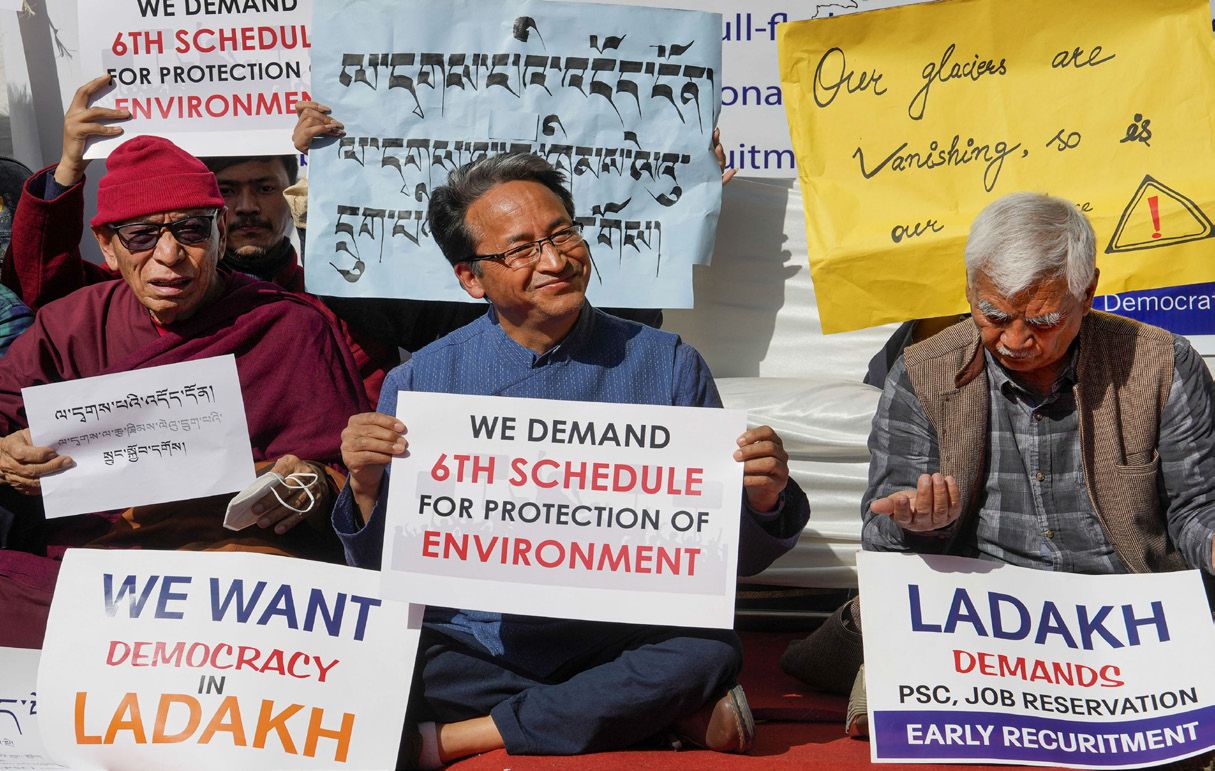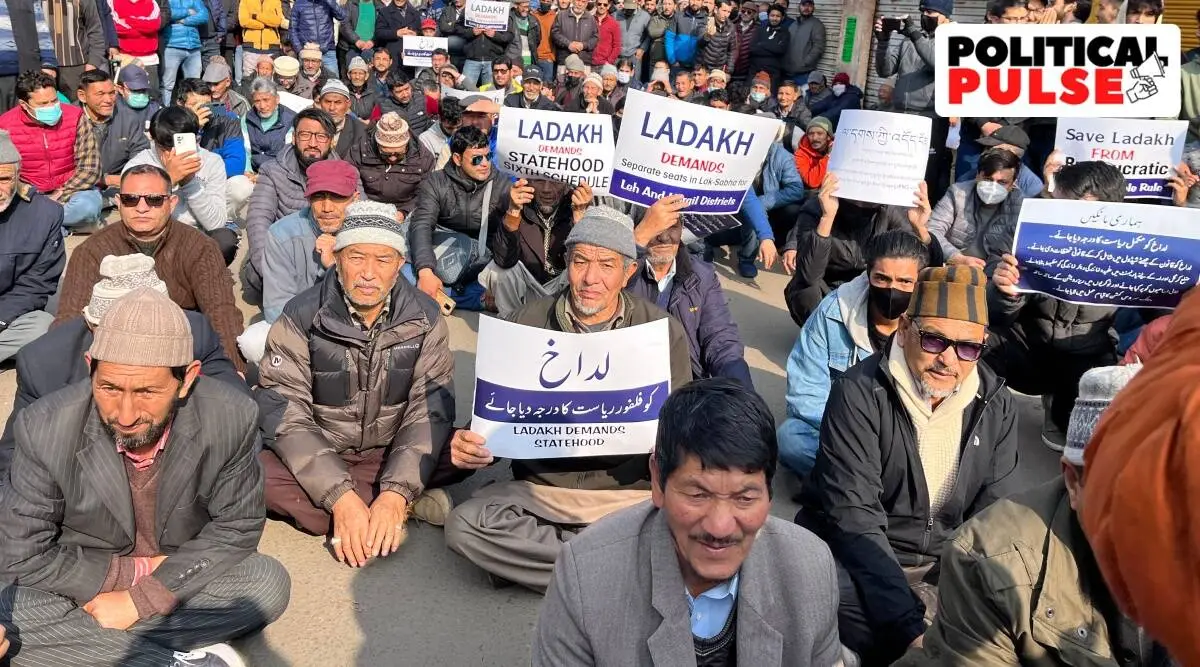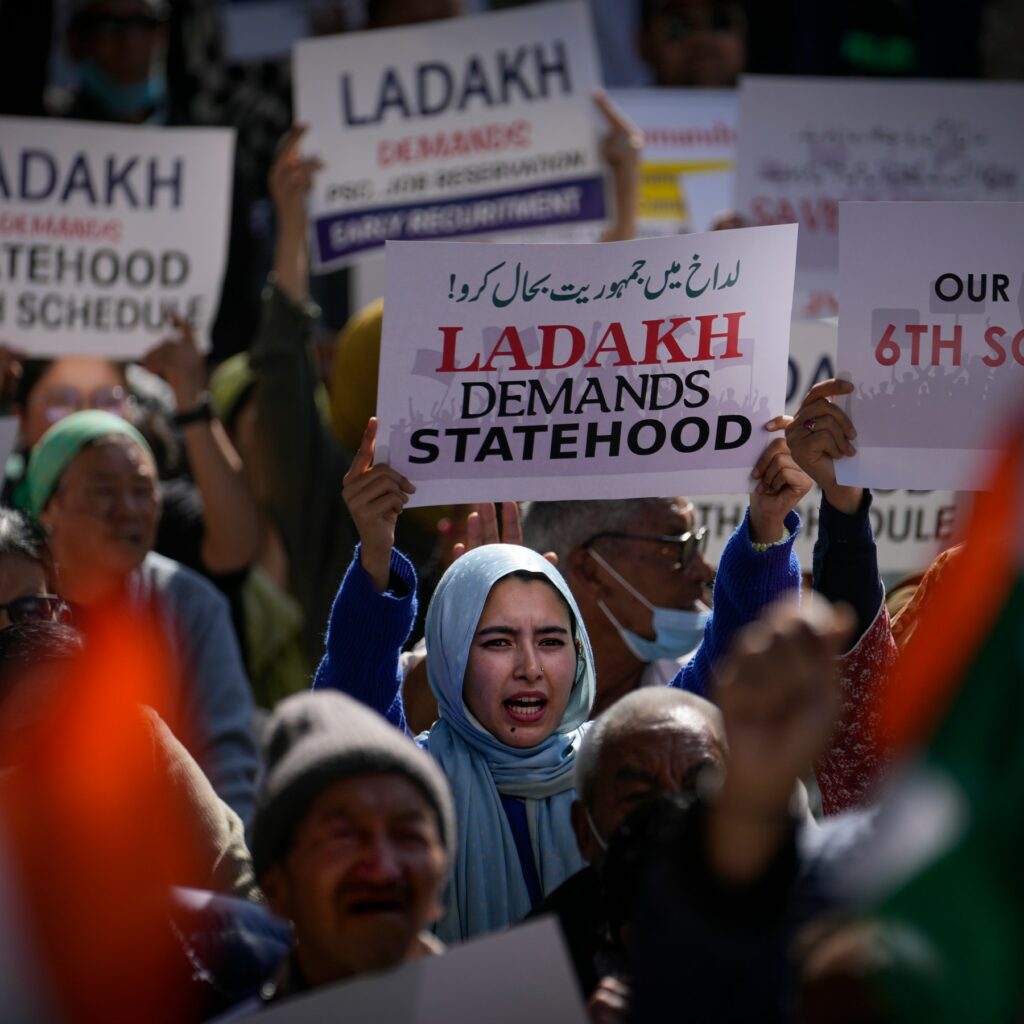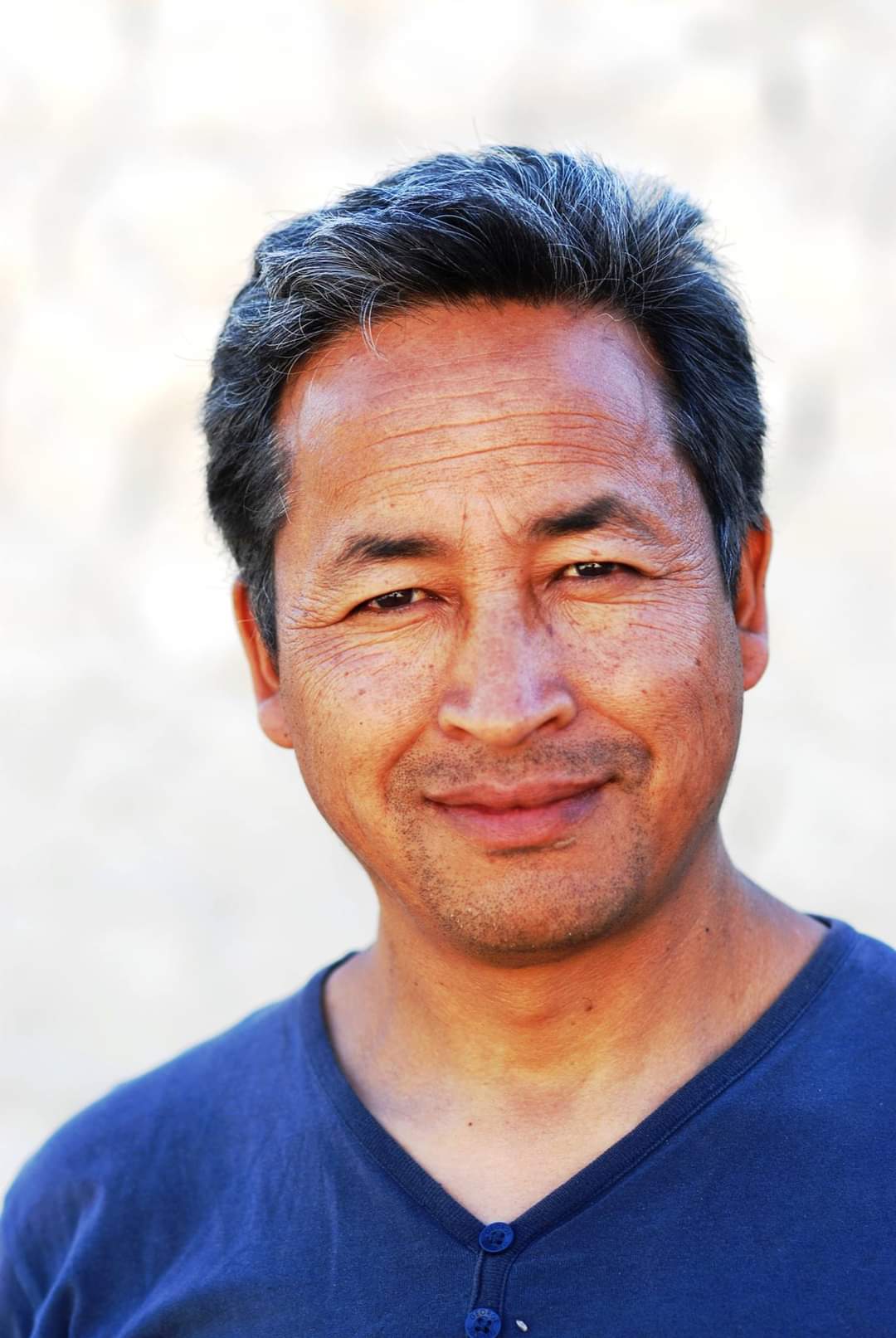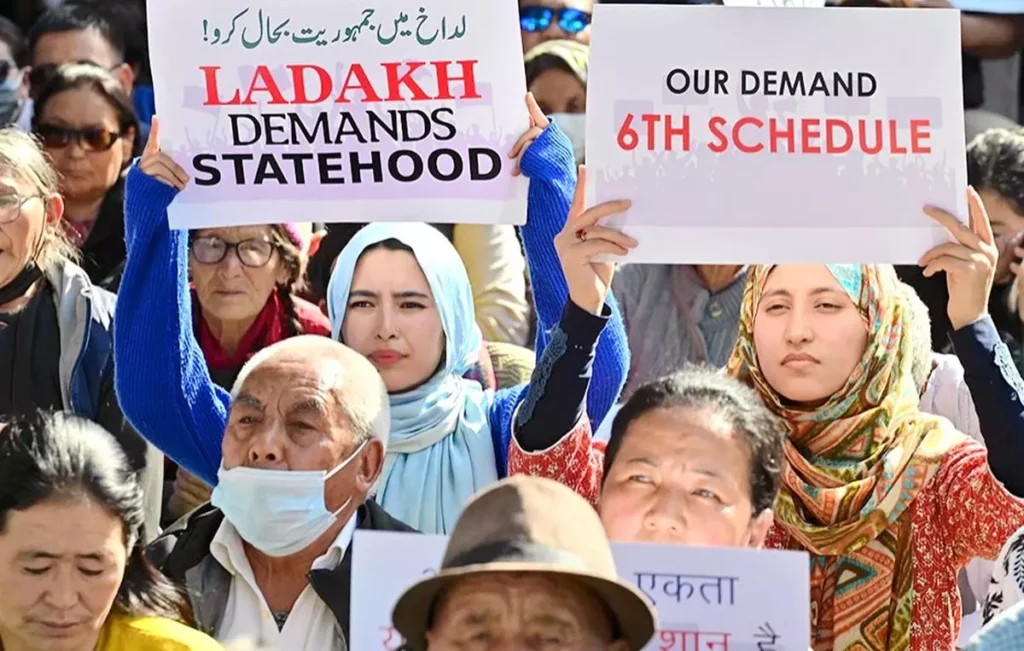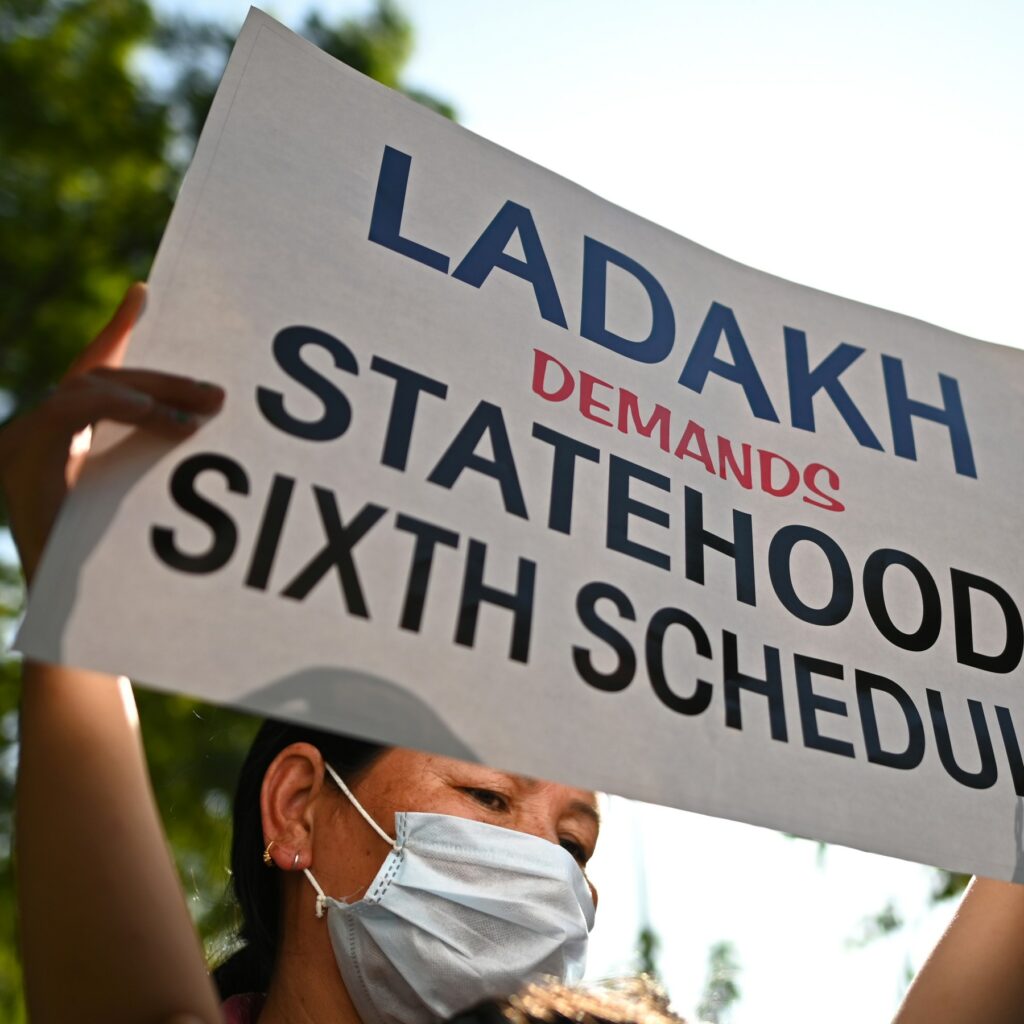With little population and more land lying vacant, Ladakh residents fear losing land and jobs to outsiders, concerned about setting up of factories and hotels in the ecologically sensitive region. 97% of the tribal population, they say, would lose their rich tradition and culture in the absence of constitutional safeguard. The residents express resentment against the government for failing to fulfil assurances.
Srinagar: More than three years after Ladakh was carved as a separate Union Territory, people in the region continue to express their resentment against the Central government for failing to fulfil the promises and assurances about safeguards made to them. The residents fear outside investment and land buying would trouble the ecologically sensitive region.
‘97% of the population in Ladakh is tribal. This Trans Himalayan region is very ecologically sensitive. Any major developmental, industrial activities or mining at large scale will directly affect indigenous tribal populations and their future as well. Any sort of activity will affect their culture, heritage and glaciers here,’ Jigmit Paljor, a local political activist said.
Fear of UT status without safeguards in Ladakh
Immediately after the special status of the erstwhile state of Jammu and Kashmir under Article 370 of the constitution was read down by the Parliament on August 5, 2019, and was bifurcated into two separate Union territories, the people of Ladakh started celebrating and were rejoiced by the Union government’s decision.
Since August 2019, the region has erupted in protests demanding constitutional safeguard to the region, multiple times. In November last year the Government notified the reconstruction of a High Powered Committee headed by MoS Home, aimed to engage in talks with Ladakh leadership following protests in the region.
Both groups together raised a 4 point agenda which include full-fledged statehood for Ladakh, 6th Schedule, formation of Public Service Commission and two separate Parliament constituencies.
Following this, two major groups Kargil Democratic Alliance (KDA) and Apex Body Leh were formed by Ladakh leadership consisting of various political, religious, student and other bodies to raise demand for the safeguard of Ladakh. Both groups together raised a 4 point agenda which include full-fledged statehood for Ladakh, 6th Schedule, formation of Public Service Commission and two separate Parliament constituencies.
MHA says no to safeguard
After two rounds of talks with the High Powered Committee (HPC), in March earlier this year Ladakh leadership met Home Minister of India, Amit Shah, following which they said there was no positive outcome of the demands raised nor any assurances were given except for the Public Services Commission.
Residents fear that without constitutional safeguard to Ladakh, outsiders would buy land there for various purposes including setting up of factories leading to greater affect to the ecologically sensitive region, requiring attention to preserve it.
Climate fast for government attention
After talks failed, Ramon Magsaysay award recipient and the region’s well known education reformist Sonam Wangchuck started a climate fast on March 6 in sub zero temperatures, joined by the local population and the leaders of Apex Body and KDA. Sonam Wangchuck completed the 21 days Climate Fast, following which he announced Pashmina March (a march towards Eastern Ladakh) and scheduled it on April 7, which didn’t happen later.
‘The Climate Fast was aimed to attract the attention of the government towards the required safeguard of Ladakh. People can do anything to any extent, but our motive was to endure all the pain,’ Sonam Wangchuck said. He said that the government has breached trust by not fulfilling their promises and assurances to give safeguards to Ladakh.
He said that the government has breached trust by not fulfilling their promises and assurances to give safeguards to Ladakh.
‘Assurances to give safeguard were made in 2019, then in 2020, 2021, 2022 and 2023 but it took them four years to finally say no to fulfill their promises in 2024,’ said Wangchuck.
Expressing his support for the 4 point agenda of the KDA and the Apex Body, he said that there is a constitutional safeguard for indigenous tribal populations which gives them law making rights. ‘Under the 6th schedule, the constitution enables them the right to make their own law regarding land, forest, social customs and culture. Indigenous local people making the law will ensure it protects the place for future generations, otherwise it is left for people who come for 3-4 years, exploit and go back,’ he said.
The Pashmina march in Ladakh
About the Pashmina March (Border March), Wangchuck said that the plan was to walk towards Eastern Ladakh in a group of close to 10,000 people. ‘The March was postponed in view of the restrictions from the government. But now it has been decided only upto 10 individuals will walk in the coming days up to the border,’ said Wangchuck.
He underlined that the Pashmina March will also highlight the amount of land captured by China in Eastern Ladakh. He also highlighted that no gazetted recruitment has taken place post 2019 in the region. ‘No one is happy, instead unemployment rate has jumped up by 26%,’ said Wangchuck.
Local leadership concerned
Chering Drojay, former Ladakh president from BJP, now the founding member of Apex Body Leh, said that the people are not happy with the central government for failing to fulfil their assurances. ‘People aren’t happy, that’s why there is agitation. After UT status, safeguard has become very important for Ladakh given it already existed with special status (370 and 35A). Population in this region is very small with a lot of land lying vacant fearing outside investment and land buying. We are finding a solution even before problems begin for residents,’ he said.
Population in this region is very small with a lot of land lying vacant fearing outside investment and land buying.
Chering Drojay, former Ladakh president from BJP, now the founding member of Apex Body Leh.
About the meeting with Home Minister Amit Shah, the Senior Ladakh Buddhist Association Vice President said that no assurances were given with regard to the 4 point agenda except for the Public Service Commission. He also said that they would hold a border March in the coming days towards Eastern ladakh but with less than a dozen people.
Rigzin Spalbar, former Chief Executive Councillor (CEC), Ladakh Autonomous Hill Development Development Council (LAHDC), Leh and the region’s prominent Buddhist leader said that safeguards under 6th schedule are particularly important for tribal culture, tribal identity and environmental protection. ‘This constitutional safeguard ensures protection of the rights of the tribal population given that there remains a constant threat to it’, he said.
Saying that there will be more trouble for the tribal population in absence of safeguards, he said that there is no rocket science in it, given all provisions of protection are available in the 6th schedule already and that’s why it is being demanded. ‘Land, ecology, environment, identity and culture will be impacted if there is no constitutional safeguard for Ladakh,’ he said.
Former Chief Executive Councillor (CEC), Autonomous Hill Development Council (LAHDC), Kargil, Feroz Khan, echoing the concerns, said that in the absence of constitutional safeguards to the region, big outsider industrialists and hoteliers would occupy the land here. ‘Land and job protection are the two main concerns for residents, both will get impacted in absence of safeguard,’ he said.
The core population of Ladakh is tribal which comprises 97% including the rest who would get affected.
Feroz Khan, Former Chief Executive Councillor (CEC), Autonomous Hill Development Council (LAHDC), Kargil.
‘The core population of Ladakh is tribal which comprises 97% including the rest who would get affected. The Government is allowing the setting up of solar energy plants in the region which is a concern. It is steps like these that mandate the demand for constitutional safeguard,’ he said. ‘After the Union Territory status was granted, people of Leh district celebrated it. But they have now also realised it is just a hollow status without any safeguard, resulting in growing concerns.’
Local youth from Ladakh fear losing jobs and land
Jigmit Paljor also said that the 4 point demand talks with the Central government failed. ‘It is very important that the government should acknowledge and initiate concrete steps to fulfil it. Ladakh is a border sensitive area and needs safeguard which is also a concern of national security. Constitutional safeguard now will mitigate the effect on future generations,’ Jigmit said.
Another resident, Anis, said that provisions under 6th schedule are exclusively for tribal people by the constitution of India and denying them to people of this region is not an appreciable step. ‘The Government needs to ensure these people are not endangered. Tribal population here would lose their rich practices to outsiders if safeguard isn’t provided. Although assurances were made, but to no avail. Jobs won’t be given only to locals and land would go to big industrialists and those interested in setting up factories,’ Anis said expressing concerns.
He also said that the government needs to make sure the people of Ladakh don’t remain unnerved due to the prevailing circumstances. ‘In a democratic setup, people must be at ease. Students need to be assured that no outsiders would be given jobs,’ he said.
Notably, as per the 2011 census, the total population of Ladakh is 274,289. The region comprises two districts: Kargil and Leh, with a single politically significant parliamentary constituency.
About the author(s)
Tasaduq Hussain is a Srinagar based journalist covering security, health, sports and borders in J&K and Ladakh.
X: @journotasaduq
